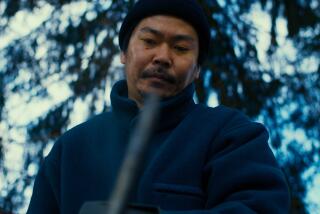Japanese Director Imai
Some thoughts on Japanese independent film director Tadashi Imai, dead at 79 in Tokyo: He was responsible for many distinguished films, including his 1991 “War and Youth”--now playing locally--despite some blacklisting for communist leanings.
I was in Tokyo in 1972 doing research in cinema and theatrical matters when I first met Imai. My introduction was through Toho production head Iwao Mori, who told me that “Kaigun Tokubetsu Nenshohei” (“Special Junior Marines”) was to be Imai’s latest in a series of anti-war films Toho was producing annually on the anniversary of Japan’s surrender.
Imai was chosen for his humanitarian record in prize-winning anti-war and social-problem films.
On the set, Imai explained that “Junior Marines,” some as young as 14, were drafted near war’s end and assigned to Iwo Jima, where more than 5,000 of them died in the fighting. His message was that if the boys hadn’t been poor, they wouldn’t have had to go into the service. (The film’s U.S. release was as “Eternal Cause.”)
On another occasion, I asked him about the message of “Night Drum,” an anti-feudal film I show students in my international cinema course. The story concerns the fatal consequences of a samurai husband being separated from his wife because of long tours of duty in the shogun’s capital.
I wondered whether Imai saw a parallel between the temptations of the old days, when feudal custom separated husband and wife for long periods, and those of the present, when Japanese businessmen are often away from home on long trips. His answer, with a smile: “Perhaps.”
The man and his message, his “eternal cause,” will be missed.
JOHN ALLYN
Radio-TV-Film Department
California State University
Northridge
More to Read
Only good movies
Get the Indie Focus newsletter, Mark Olsen's weekly guide to the world of cinema.
You may occasionally receive promotional content from the Los Angeles Times.









